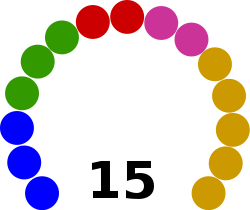
Back Veiligheidsraad Afrikaans Sicherheitsrat der Vereinten Nationen ALS مجلس الأمن التابع للأمم المتحدة Arabic مجلس الامن ARZ Conseyu de Seguridá de les Naciones Xuníes AST Цолъарал Миллатазул ГӀуцӀцӀиялъул ХӀинкъибукӀунгутӀиялъул Мажлис AV Birləşmiş Millətlər Təşkilatının Təhlükəsizlik Şurası Azerbaijani بیرلشمیش میلتلر گوونلیک شوراسی AZB БМО-ның Именлек Советы Bashkir Jongtėniu Tautū Saugoma Tarība BAT-SMG
 UN Security Council Chamber in New York City | |
| Abbreviation | UNSC |
|---|---|
| Formation | 24 October 1945 |
| Type | Principal organ |
| Legal status | Active |
| Headquarters | New York City, U.S. |
Membership | |
Presidency | United Kingdom (November 2024) |
Parent organization | United Nations |
| Website | un |

African States (3)
Asia-Pacific States (3)
Eastern European States (2)
Latin American and Caribbean States (2)
Western European and Other States (5) | |
The United Nations Security Council (UNSC) is one of the six principal organs of the United Nations (UN)[1] and is charged with ensuring international peace and security,[2] recommending the admission of new UN members to the General Assembly,[3] and approving any changes to the UN Charter.[4] Its powers as outlined in the United Nations Charter include establishing peacekeeping operations, enacting international sanctions, and authorizing military action. The UNSC is the only UN body with authority to issue resolutions that are binding on member states.
Like the UN as a whole, the Security Council was created after World War II to address the failings of the League of Nations in maintaining world peace. It held its first session on 17 January 1946 but was largely paralyzed in the following decades by the Cold War between the United States and the Soviet Union (and their allies). Nevertheless, it authorized military interventions in the Korean War and the Congo Crisis and peacekeeping missions in Cyprus, West New Guinea, and the Sinai Peninsula. With the collapse of the Soviet Union, UN peacekeeping efforts increased dramatically in scale, with the Security Council authorizing major military and peacekeeping missions in Kuwait, Namibia, Cambodia, Bosnia and Herzegovina, Rwanda, Somalia, Sudan, and the Democratic Republic of the Congo.
The Security Council consists of fifteen members, of which five are permanent:[5] China, France, Russia, the United Kingdom, and the United States. These were the great powers that were the victors of World War II (or their recognized successor states). Permanent members can veto (block) any substantive Security Council resolution, including those on the admission of new member states to the United Nations or nominees for the office of Secretary-General. This veto right does not carry over into General Assembly matters or votes, which are non-binding. The other ten members are elected on a regional basis for a term of two years. The body's presidency rotates monthly amongst its members.
Resolutions of the Security Council are typically enforced by UN peacekeepers, which consist of military forces voluntarily provided by member states and funded independently of the main UN budget. As of November 2021[update], there have been 12 peacekeeping missions with over 87,000 personnel from 121 countries, with a total annual budget of approximately $6.3 billion.[6]
Cite error: There are <ref group=lower-alpha> tags or {{efn}} templates on this page, but the references will not show without a {{reflist|group=lower-alpha}} template or {{notelist}} template (see the help page).
- ^ "Article 7 (1) of Charter of the United Nations". Archived from the original on 10 April 2019. Retrieved 4 September 2017.
- ^ "Article 24 (1) of Charter of the United Nations". Archived from the original on 10 April 2019. Retrieved 4 September 2017.
- ^ "Article 4 (2) of Charter of the United Nations". Archived from the original on 10 April 2019. Retrieved 4 September 2017.
- ^ "Article 108 of Charter of the United Nations". Archived from the original on 10 April 2019. Retrieved 4 September 2017.
- ^ "Article 23 (1) of the Charter of the United Nations". www.un.org. United Nations. 26 June 1945. Archived from the original on 10 April 2019. Retrieved 10 December 2018.
- ^ "Data for November 2021" (PDF). United Nations Peacekeeping. Archived (PDF) from the original on 11 July 2022. Retrieved 19 June 2022.
